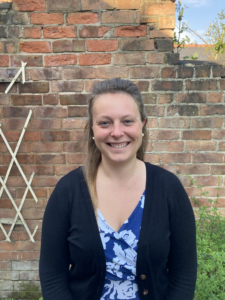We are delighted to announce the six new Fellows selected for the 2023 Lister Prize. Each year we select applicants whose early-career success indicates exceptional potential for future biomedical research.
This year, as ever, our Fellows represent a wide range of research areas. Their work contributes to a greater understanding of disease and pathogens and the body’s healing mechanisms, supporting the development of new therapeutic approaches.
Dr Fiona Jane Whelan, University of Nottingham

Individuals with cystic fibrosis harbour chronic pathogenic lung infections which cause most of the morbidity and mortality in this population. The Whelan lab aims to identify microbial genes within the lung microbiome which inhibit these pathogens and can potentially be used as novel therapeutic targets.
Fiona’s lab uses high-throughput microbiology to identify microbes that can inhibit pathogens. They find that many of these interactions are strain-dependent, meaning that it is the genes present in some but not all strains of an organism which contribute to this inhibition.
Read more about Fiona’s work here: http://www.whelanlab.co.uk/
“The Lister Prize will not only allow me to join a prestigious community of biomedical scientists but will also give me the freedom to grow my research group to work on new and innovative ideas.”
Dr. Helen Weavers, University of Bristol

The cells and tissues within our bodies encounter many challenges over their lifetime, such as physical damage or toxin exposure. Yet many tissues display remarkable resilience to these internal and external threats, continuing to function and even thrive in the face of adversity. Helen’s group studies the molecular basis of this biological resilience. By discovering why some tissues have robust capacity to resist or repair damage and ‘bounce back’, they aim to harness these powerful biological shields therapeutically to enhance tissue recovery after insult.
Helen’s team recently discovered that biological resilience is key to maintaining a healthy immune system, where it prevents activated pro-inflammatory immune cells from causing systemic collateral damage. By investigating these processes using cutting-edge imaging and omics approaches, Helen’s lab is identifying new ways to enhance immune resilience across the life-course and promote healthy ageing.
Read more about Helen’s research here: https://www.tissueresilience.com/
The cells and tissues within our bodies encounter many challenges over their lifetime, such as physical damage or toxin exposure. Yet many tissues display remarkable resilience to these internal and external threats, continuing to function and even thrive in the face of adversity. Helen’s group studies the molecular basis of this biological resilience. By discovering why some tissues have robust capacity to resist or repair damage and ‘bounce back’, they aim to harness these powerful biological shields therapeutically to enhance tissue recovery after insult.
Helen’s team recently discovered that biological resilience is key to maintaining a healthy immune system, where it prevents activated pro-inflammatory immune cells from causing systemic collateral damage. By investigating these processes using cutting-edge imaging and omics approaches, Helen’s lab is identifying new ways to enhance immune resilience across the life-course and promote healthy ageing.
Read more about Helen’s research here: https://www.tissueresilience.com/
“The Prize’s generous and flexible funding will allow me to greatly expand the group’s research of biological resilience mechanisms and their role in sustaining a healthy immune system.”
Dr Joana Neves, King’s College London

Joana’s research group aims to understand how the various cellular compartments of the gut, including immune, epithelial, stromal, microbial, and neural cells, communicate with each other. Their objective is to direct those conversations to promote gut homeostasis. To achieve this, they employ interdisciplinary approaches and develop complex organoid models.
These strategies allow them to address critical questions surrounding the intricate dynamics of gut cellular interactions, in particular the ones involving Innate Lymphoid Cells, which are key players on intestinal immune responses.
Read more about Joana’s work here: https://www.kcl.ac.uk/research/neves-lab
“The financial freedom that the prize brings will enable us to enhance our current projects and to explore novel and higher-risk avenues of research on the roles of Innate Lymphoid Cells in health and disease.”
Dr John Knight, University of Manchester

Translation elongation turns the genetic code into functional protein, but also uses a vast amount of energy. John has helped build a model where two types of elongation dependency arise in disease. Class 1 dependencies increase the rate of elongation to elevate protein synthesis. Class 2 dependencies suppress elongation to preserve energy.
Using cancers with different dependencies, his group studies the underlying biology of elongation-dependent disease. They are also identifying new druggable elongation regulators to precisely target elongation dysregulation in disease.
Read more about John’s work here: https://research.manchester.ac.uk/en/persons/john.knight
“I am looking forward to joining the Lister community and building my research group with this amazing Prize. The money will be used to develop much-needed methods to study and ultimately target translation elongation in disease.”
Dr Kirby Swatek, University of Dundee

Ubiquitin and ubiquitin-like proteins are among the most predominant post-translational modifications in eukaryotic cells. These modifications are crucial for maintaining a healthy cellular environment as mutations in these signalling systems are frequently associated with disease. Fascinatingly, it has emerged that during specific conditions these modifiers become ‘inactive’ and can no longer perform their normal cellular functions.
Kirby’s research group is interested in exploring this emerging area of misregulation which may prove critical for identifying new disease biomarkers and novel therapeutic targets.
Read more about Kirby’s work here: https://www.ppu.mrc.ac.uk/index.php/research/principal-investigator/kirby-swatek
“It is an incredible honour to be awarded a Lister Prize. With the generous support from the Lister Institute, I can now build an exciting new line of research in my laboratory to further our understanding of health and disease.”
Dr Srikanth Ramaswamy, University of Newcastle-upon-Tyne

The brain continuously adapts and responds to ever-changing behavioural demands. It achieves this by controlling the function of nerve cells (neurons) and their networks through the release of neuromodulators. Neuromodulators – dopamine, acetylcholine, serotonin, noradrenaline or histamine – are chemical messengers that govern the emergence of brain oscillations by controlling the activity of neural networks and regulating shifts between behavioural states such as sleep and wakefulness or distraction and attention.
Srikanth’s research seeks to understand the mechanisms through which neuromodulators shape cognition in mammalian brains and utilize this knowledge to build computational models of how the brain implements cognitive functions.
Read more about Srikanth’s work here: https://www.ncl.ac.uk/medical-sciences/people/profile/srikanthramaswamy.html
“The flexibility of funding provided by a Lister Prize will empower me to build a multidisciplinary team to open up a new research direction at the interface of biological and artificial neural networks.”
Apply for the 2024 Lister Prize Fellowship
Applications for the 2024 Prize will open on 5 July, 2023.
We welcome applications from early-career biomedical researchers across the UK and the Republic of Ireland who feel that the funding would make a major difference to their work.
We offer a prize of £250,000 (awarded as a lump sum grant) that must be spent within five years. It can be used for any research costs and expenses, including the salaries of post-doctoral workers, technicians, or PhD students, except your own salary.
Please keep an eye on the website, Twitter, and LinkedIn for further announcements.
Meanwhile, you can find out more about the Prize on this page: http://lister-institute.org.uk/what-are-the-research-prizes/
There are further details about eligibility here: http://lister-institute.org.uk/eligibility/
And this page describes the application process in more detail: http://lister-institute.org.uk/how-to-apply/



